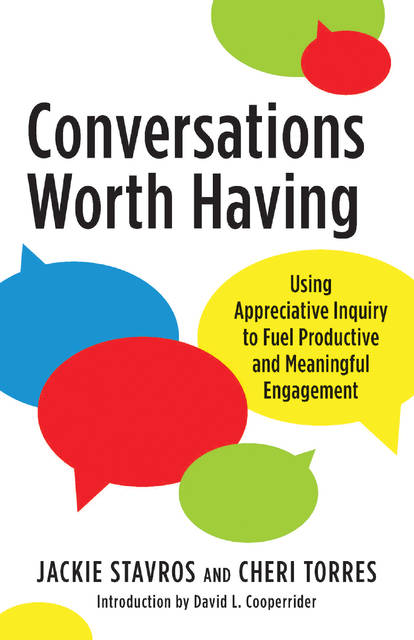By Brett Milam
Editor
The tit-for-tat delicacies of having a conversation is dinner table etiquette: we all kind of know it, but we don’t usually follow it.
Jacqueline M. Stavros and Cheri Torres, authors of the new book, “Conversations Worth Having: Using Appreciative Inquiry to Fuel Productive and Meaningful Engagement,” released on May 22, 2018, talked with The Sun to help us along.
Stavros is a professor at Lawrence Technological University and Torres is a senior consultant with NexMove.is, an organization that helps other organizations to change and grow through techniques similar to those found in the book.
Torres said they sought to make this a book all people could utilize.
“It became a book that anyone, anywhere could pick up and be able to change the outcomes of their conversation to support well-being, to support stronger relationships; government was a piece of it, I mean, what’s happening in our country was a piece of it, but that’s happening everywhere, people get stuck circling and focusing on the problems and it doesn’t give you innovative solutions or creative solutions and it’s not good for your person well-being, either,” she said.
Getting AI into the hands of the people was a powerful step they felt they could take since they said it’s a big part of their lives. And that was the idea: that these principles are applicable beyond just political conversations since they work in any situation, in your own head, at the dinner table or at the board meeting.
In the last 15 years, the American public, particularly as filtered through the political realm, have only grown more partisan and less ideologically consistent, according to the Pew Research Center. For example, in 2004 only 1-in-ten Americans were uniformly liberal or conservative across most values, but a decade later, two years into Barack Obama’s second administration, the number had grown to 21 percent.
Put a different way, it was more common 25 years ago to have liberal Republicans and conservative Democrats than it is today.
Often, as Arthur Markman, a professor of psychology at the University of Texas at Austin put it, conversations don’t even exist anymore; instead, people who disagree with each other just “happen” to be talking in the same room as each other or if they do engage in any fashion, it’s to talk at each other than with each other.
The core of what makes a conversation flourish, according to Stavros and Torres, is Appreciative Inquiry (AI), a generative theory focusing on positivity. AI has been applied to a wide-range of disciplines and fields of study after being founded and articulated by David Cooperrider, who also wrote the foreward to their book.
Particularly, Conversations Worth Having is the first book of its kind to anchor AI within interpersonal communication and to do so in a way that’s accessible to everyday people rather than academics.
Stavros said, when having these difficult sorts of conversations, two general principles can help: reframing questions more positively and asking productive questions. Doing those two things can shift another person’s attitudes, which itself can bring about resolution to stubborn issues.
Tone and direction are also important to fruitful conversation, Stavros said, and there are five principles that make up tone and direction:
- Social construction: our words are going to construct a real, viable enriching environment for the future or we “can keep coming at each other,” she said.
- Simultaneity: these are questions that can open you up or shut you down.
- Poetic: the idea of multiple truths and multiple realities (so, no single truth) to help come at a solution.
- Anticipatory: positive images and actions lead to positive results.
- Positive: the more positive our engagement, the longer-lasting the results are going to be; it “adds life to you,” Stavos noted.
“We are hard-wired to scan for problems and to see what’s a threat to us,” Torres said.
That orientation makes us think we are the thoughts and emotions we have rather than stopping to see those things as signals rather than drivers for a conversation, she said.
Stavros said an example of a generative question, is if she comes to someone who has a problem and says, “What is it that you would like to see happen? Why is this important to you? How should we move forward?”
Instead of asking, “What’s wrong?” or “Who is to blame?” Those questions just cause the conversation to spiral downwards, she said.
People just want to be heard, understood and seen, Torres said.
And it’s not just about positive; the inquiry side of AI is important, too. If a conversation consists of just back-and-forth approbation, then it can feel false, Stavros said, and ultimately, be destructive.
In these highly-polarized times, it may feel like it’s not even worth having a conversation with those of differing ideologies or beliefs, but Torres would ask such people who think that way, “What would make that conversation worth having for you?”
Torres said it’s not about changing people’s minds, per se, but about hearing and understanding one another. Instead of starting a conversation with, “Here’s my solution,” instead, Torres said, start with, “What is the issue you are working on?”
“What’s going on beneath your solution?” she said. “Asking questions to understand what do they need, how did they arrive at this.”
The Sun invites readers to share their thoughts with us about the kinds of conversations they are having, political and otherwise, and what makes them worth having. Please email the editor, Brett Milam, at bmilam@clermontsun.com.

